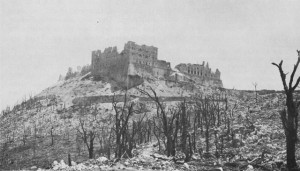
Churchill and the Destruction of Monte Cassino Abbey, 1944
Cassino Abbey
An Italian journalist writes for Churchill references to the attacks on Monte Cassino during the Italy campaign in spring 1944, asking about “his silence, later contradictory” on the bombing of the town’s ancient monastery. If the implication is that Churchill was uncaring over the destruction of ancient shrines and grand buildings, that would contradict his revulsion over the bombing of Dresden. If it is that this particular destruction didn’t appear in his statements at the time, that is true. War is hell, and to expect him to eulogize every devastating loss is to expect a lot. He did more eulogizing than his allies.
Churchill issued many letters and speeches on the Anzio and Cassino campaigns, and provided a very frank account in Closing the Ring. (Less “soft underbelly,” Mark Clark said, than “tough gut.”) He broadcast about the campaign on March 26th, though he was far from well, and it showed. Later he paid a three-week visit to Mediterranean theaters of war, returning exhausted and with pneumonia. We tend to forget the strain that war put upon those who had to direct it. “People seem to think that Winston’s broadcast last night was that of a worn and petulant old man,” Harold Nicolson wrote in his diary on March 27th. He added: “I am sickened by the absence of gratitude towards him.”
Campaign in Italy

We hear a great deal about Churchill’s support for the “futile and wasteful” Italian campaign. Yet Martin Gilbert notes that Hitler admitted it had tied up 35 German divisions in 1944. That, Churchill telegraphed to Stalin, was 35 fewer divisions than might have opposed Operation Overlord, the upcoming invasion of France in June. On May 18th the town and monastery of Monte Cassino finally fell to Alexander‘s army. Polish troops took the monastery itself. The Poles were “elated,” General Wilson telegraphed to Churchill. “I am very glad the battle is going so well,” Churchill replied.
The capture of Cassino was “a trophy,” Churchill telegraphed to Stalin. He noted that the Poles and French had “fought bravely. Some 30 German divisions remained in Italy, “away from Overlord.”
More than met the eye
Churchill could have used a better word than “trophy,” though from his standpoint there were few trophies to brag about. Of course he desperately wanted to reassure Stalin. Only later did it come out that most of the abbey’s treasures, and personnel, were removed by the Germans before the destruction, and that both sides had pledged not to molest it. From Calvocoressi, Wint and Pritchard, Total War: The Story of World War II (second edition 1985):
The Germans supervised the removal to Rome of the abbey’s treasures and most of its monks in October 1943 when the U.S. Fifth Army, by crossing the Volturno and then the Sangro rivers, threatened the Gustav Line. Monte Cassino, although an obstacle to allied progress, was not of prime military importance. It was surrounded by higher peaks. Combatants supposedly assured the Pope that the abbey would be neither fortified nor attacked from the air….
Fog of war
So the abbey should have survived—but war is hell, and its uncertainties worse. The authors continue:
…The Germans denied that the abbey was being used for military purposes but their enemies were not prepared to believe anything they said and General Ira C. Eaker, who was one of a number of senior commanders to make a personal air reconnaissance, reported that he had seen German troops in the abbey. The allied command declared that the abbey would no longer be spared and although American, British and French generals opposed its bombardment it was attacked on 15 February by 142 Flying Fortresses and destroyed. This operation was, however, fruitless.
The battle resumed a month later. Air and artillery bombardment ultimately reduced the town of Monte Cassino to a shambles. Not until May was the assault over. The cost was higher for the Allies than the enemy. Monte Cassino produced 55,000 Allied casualties, compared to an estimated 20,000 for the Germans.






